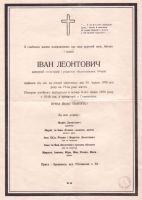Leontovyč (Leontovych), Ivan – Materials from Personal Inheritance
Ivan Leontovyč (Leontovych) was born on 1 January 1893 (in the village of Teniatyska in Galicia, today’s Poland). He died on 30 June, 1970 in Prague, where he had been an artistically active member of the Ukrainian-Galician (Ukrainian) community in Czechoslovakia for a considerable part of his life. He was mainly interested in poetry: he wrote many poetic texts (thematically drawing especially on Ukrainian and Galician history or mythology with the aim of cultivating the Ukrainian national spirit and awareness), in particular extensive poems. Nevertheless, he is also known for his prose and his works of art (a painting, sketches); he was further interested in Ukrainian and Galician (Carpathian) history.
He completed three semesters of theology at Ukrainian University in Lviv (1921–1922) and three semesters at the Faculty of Arts of Charles University (1923–1926). Professionally, he worked as a stenographer in the Ukrainian Central Council in Kiev (1917–1918) and in the Czechoslovak National Assembly (1924–1939 and 1945–1948), and as an editor of the Press Department of the Presidium of the Council of Ministers (1939–1941). In 1948–1953, he was imprisoned. Subsequently, he worked in the field of the preservation of monuments and in various Prague companies (e.g. Autoslužba). In the 1960s, he was engaged in activities in associations (philately and the Ukrainian expatriate community in Prague).
The archival documents of 0.4 linear metres are deposited in three archival boxes and one packaging box. They are divided into four basic parts:
- Leontovych’s own biographical material (including his personal correspondence and notes);
- literary production (of Leontovych as well as other persons);
- documents of his family members;
- illustrative material.
The earliest archival document in the collection is a mounted photograph of the so-called western group of the Boian choir in Lviv (Львôвскій Боянъ) from 1892, the latest the History of the Leontovych Family, written by Leontovych’s grandson Adrian Leontovych as a grammar-school essay in 2003. Nevertheless, the major part of the archival collection falls between the mid-1920s and mid-1950s (when it is connected directly with Leontovych) and between the mid-1950s and the mid-1970s (in the case of family members).
Leontovych’s literary works are represented here by poetry, usually focusing on Galician and Ukrainian national themes, with the exception of several poems (which are his own or are his translations of Czech authors) on the topic of February 1948. We can also find poetry intended for and dedicated to his children.
Among the materials of the family members, their personal correspondence with Leontovych is predominant.
None of the documents is connected to Leontovych’s activities of the political or national-resistance character (in favour of the Ukrainian national movement), which were claimed to be the reason for his imprisonment. Works by other authors (essentially their samizdat copies) deal mainly with historical topics related to Ukraine (either as a purely Ukrainian theme or in the Polish or Russian context) mostly from the turn of the 20th century.
